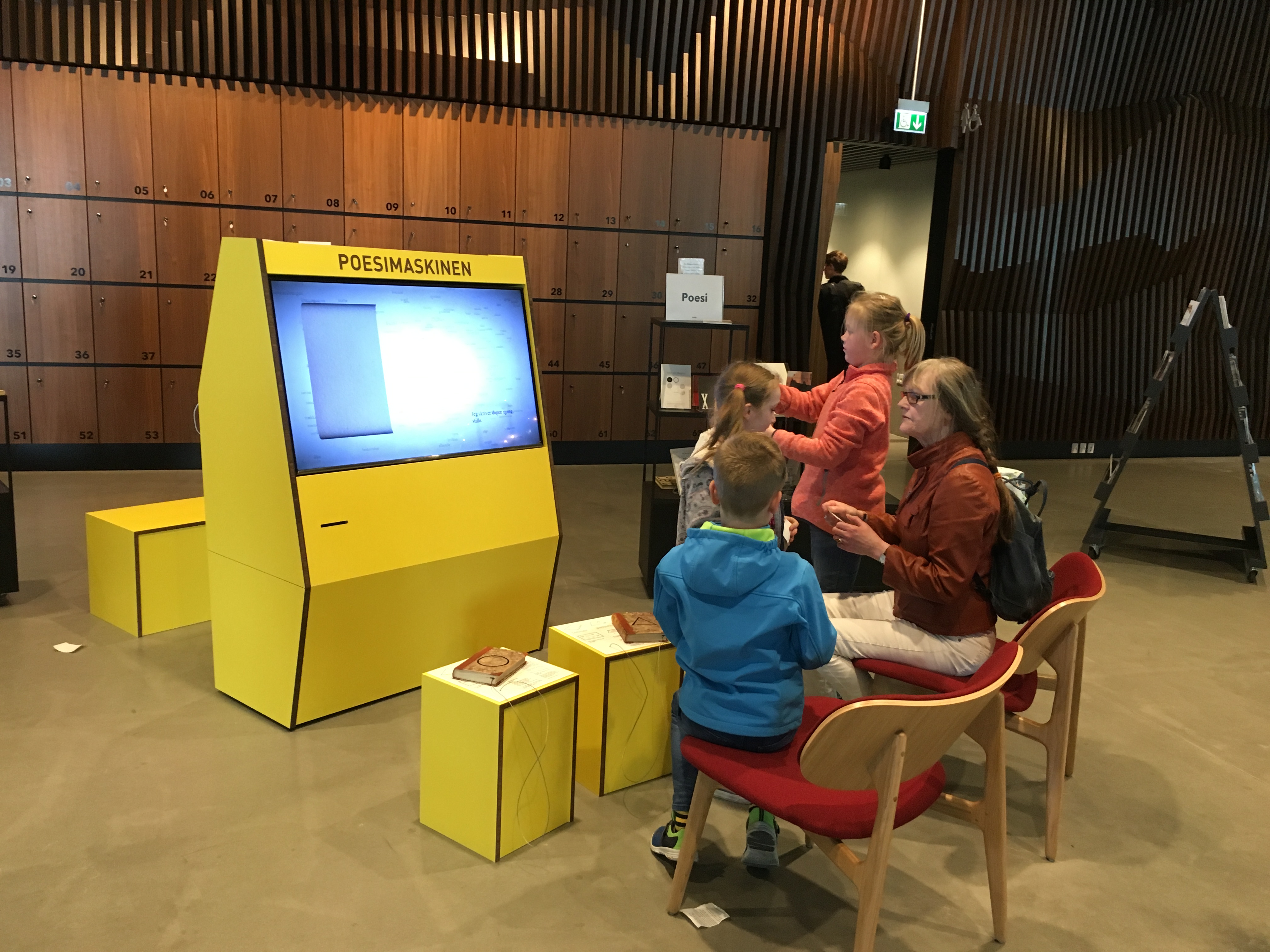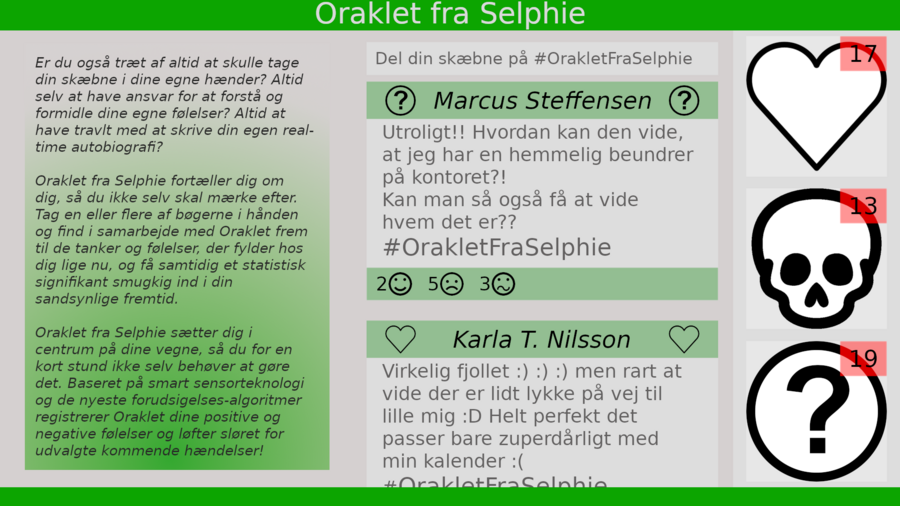The Poetry Machine (also known as Ink After Print and Blæk) is an interactive, participatory, digital literary installation made in a collaboration between PIT-researchers at Aarhus University, CAVI/Tekne Productions and Roskilde Libraries initiated during the Literature Takes Place (Litteraturen Finder Sted) project and first exhibited in 2012 and further developed in several projects including the Creative Europe project Turn On Literature, http://www.turnonliterature.eu/, with Roskilde, Bergen and Antim Ivireanul Valcea County Libraries in Denmark, Norway and Rumania. In 2022 The Poetry Machine was included in the Electronic Literature Collection, vol. 4, published by the Electronic Literature Organisation.
The Poetry Machine is designed to make people affectively engage with, and reflect on, the ergodic qualities of digital literature in public settings such as libraries and events. Through their engagement with The Poetry Machine, people can – individually or collaboratively – produce poems by interacting with three books embedded with a sensor system. The interactive books let people control a floating sentence in an ocean of words toward a sheet of paper to produce a poem, all visualized on a large display. The sentences are retrieved from a database. When the poem reaches a set limit, it is printed out in a form similar to a library receipt that people can take with them. The poems also appear on a blog updated in real-time, where people can read their own and others’ poems, and comment on them.
The Poetry Machine has been exhibited at many libraries across Denmark, at numerous conferences and seminars and at Roskilde Festival, and several thousand poems has been produced. Furthermore, it has been exhibited by the libraries in Bergen and Antim Ivireanul Valcea County, who also host versions of it. Finally, has also been presented and exhibited at international conferences in e.g. Bergen, Edinburgh, Paris, Coventry, Bremen and at Electronic Literature Organisation Conferences in Milwaukee, Porto and Montreal.
For a scenario video see here: http://media.cavi.dk/228/607914?player=true and a video from Roskilde Festival with interviews and interaction can be seen here: http://media.cavi.dk/228/607868?player=true
The Poetry Machine was first build in Danish as Tilfældigvis er skærmen blevet blæk (Accidentally, the Screen Turns to Ink). The Danish website can be found here: http://blaek.netlitteratur.dk/. It is hosted at Roskilde Library and can be borrowed by public libraries. It has gradually become a platform and texts for The Poetry Machine has been written by Peter-Clement Woetmann, Ursula Andkjær Olsen (Danish), Radu Vancu (Romanian), Morten Langeland (Norwegian) and Yan St-Onge and Benoit Bordeleau (French-Canadian/Quebec). Most texts have also been translated into English and some into French. The latest version is written by Jakob Fredslund, called “Oraklet fra Selphie” (The Oracle from Selphie) and is a horoscope machine inspired by social media and the ways we write and read our destiny via these.
The English version of Ink is hosted by CAVI and is planned to be used for new development and experimentation within the PIT and Literature Between Media research projects.
Literary publications:
Skraldekunst, (a writing experiment with the poetry machine and Ursula Andkjær Olsen’s text, conducted by Jørn Erslev Andersen, Malthe Erslev and the students from Æstetik & Kultur at Aarhus University, 2019. )
Peter-Clement Woetmann: 105 Variationer, Arena, 2015.
Research publications:
Erslev, Malthe Stavning. “Exhibiting, Disseminating, Teaching: Digital Literature in Danish Public Libraries.” ELO Conference and Media Arts Festival, 2020, https://stars.library.ucf.edu/elo2020/asynchronous/proceedingspapers/7/
Bro Pold, Søren. “Critical Attention and Figures of Control: On Reading Networked, Software-based Social Systems with a Protective Eye”, Electronic Book Review, December 6, 2020.
Pold, Søren and Christian Ulrik Andersen The Metainterface: The art of platforms, cities and clouds Cambridge, Massachusetts.London, England: MIT Press. 2018. https://mitpress.mit.edu/books/metainterface
Mencia, Maria, Søren Pold, and Manuel Portela. “Electronic Literature Translation: Translation as Process, Experience and Mediation.” Electronic Book Review (01.06.2018 2018), http://electronicbookreview.com/essay/electronic-literature-translation-translation-as-process-experience-and-mediation/
Fritsch J, Pold SB, Vestergaard LS, Lucas M. “INK – Designing for Performative Literary Interactions”. Personal and Ubiquitous Computing. 2014. Accessible here: 10.1007/s00779-014-0767-2
Pold, Søren Bro and Christian Ulrik Andersen. “Post-digital Books and Disruptive Literary Machines: Digital Literature Beyond the Gutenberg and Google Galaxies”. Formules/Revue Des Creations Formelles. 2014.
Design & concept development: Malthe Stavning Erslev, Jonas Fritsch, Lasse Steenbock Vestergaard, Søren Pold, Martin Campostrini, Allan Thomsen Volhøj, Ann Luther Petersen
3D programming and implementation: Jonas Oxenbøll Petersen, Janus Bager Kristensen, Rolf Bagge, Peter Friis-Nielsen
Sound design: Rune Wehner
Authors: Peter-Clement Woetman (Danish), Ursula Andkjær Olsen (Danish), Radu Vancu (Romanian), Morten Langeland (Norwegian), Yan St-Onge and Benoit Bordeleau (Canadian/Quebec) and Jakob Fredslund (Danish).
Translators: Morten Visby, Emilie Barbier and others.
Contact: Søren Pold: pold (at) cavi.au.dk


One thought on “About The Poetry Machine”
Comments are closed.